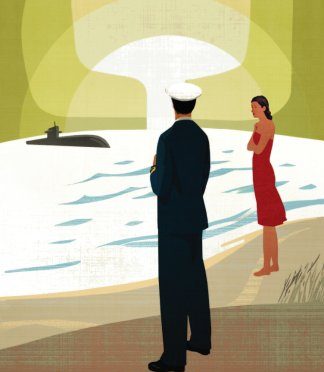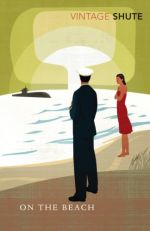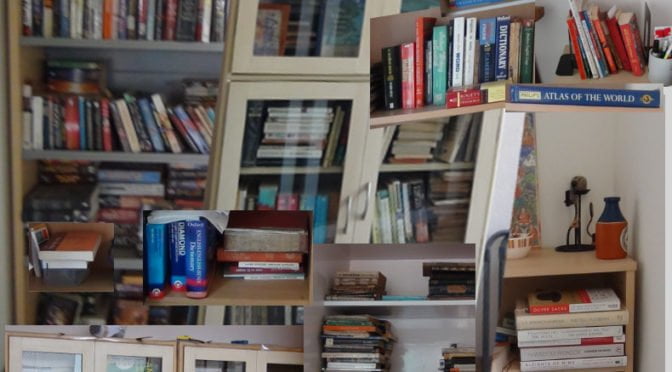Title: On the Beach
Author: Nevil Shute
Genre: Science fiction
Reviewer: Swapna Kishore
Rating: (Reviewed onAugust 28, 2013 )
Brief comments: A classic. A gentle and uplifting story set in a world where everyone is doomed to die as the aftermath of nuclear war. Leaves readers with a sense of quiet dignity and hope in spite of the depressing scenario.
I first “met” Nevil Shute in my college library. I think I ended up reading all his books there; most of them left me with a warm and fuzzy feeling. I finished college, and I assumed I’d never get to see the books again. I was no longer a member of an easy-to-access library that had old books, and to read an old favourite I had to hunt it down and buy it. I got a pleasant surprise some years ago when I saw a shelf full of freshly printed Nevil Shutes in a bookshop, along with many other books I’d given up on. I got myself some sparkling new copies of old favorites, including On the Beach.
On the Beach , a story placed in Australia, describes a world where several nuclear bombs were dropped in the Northern hemisphere in wars that went horribly wrong, and the radioactivity is drifting slowly to the Southern Hemisphere, to Australia (which was uninvolved in the war). Everyone will die. With that premise and setting, Nevil Shute has crafted a book that is gentle and dignified in an unusual way. One would think that a book where everyone is doomed to die has to be a down-and-out depressing book, but that’s not how I experienced it. The book left me sad in some ways, but also gave me hope that perhaps a society can handle inevitable death with dignity.
The book is considered a classic. When I first read the book, I had gobbled the story hungrily. When I bought it years later and re-read it, I savored it in a more relaxed way. Our world is full of conflict. The possibility of out-of-control wars and annihilation is not so low as to be ignored. I wondered, as I re-read this book, how humanity will cope in a situation similar to what Shute has shown. I suspected we would have conflict, anger, enmity, and that was a dismaying thought. How would people cope with a doom (not of their making) that they cannot evade? I thought of the world Shute had shown, and wondered if maybe we would be able to show the same gentleness as he depicted. Make the most of what remains. It was an interesting thought. Good books make one think, and that’s what this book did for me.
On the Beach is not for readers who like fast-paced works. It was written several decades ago, and many readers, accustomed (addicted?) to thrillers, are likely to find it slow or boring or defeatist. The use of English old-fashioned. The way characters interact is based on an older time, and probably very different from how relationships work now, so the younger readers may find the characters and their interactions implausible. Also, most novels on the aftermath of an all-out nuclear war (or any other major world-destroying event) depict struggling survivors, warring groups, bitterness, people driven underground, people driven into hiding by out-of-control robots, people who are desperate and angry and would do anything to survive (or die trying). But in On the Beach the characters know they cannot survive, accept this inevitability, and deal with it at a personal level. There are no major upheavals or the sort of things we find in most modern thrillers and novels. Of course, it is possible that some younger readers may enjoy the change of style and pace, though, just for variety.
Me, I re-read it again recently and found that I still like the book. It still gives me a warm, fuzzy feeling. It still makes me ponder. I guess I’m partly old-fashioned; though I love modern thrillers, too–I enjoy a spread with variety when it comes to reading. It gets somewhat monotonous to see the same sort of overactive characters novel after novel, all cued to action and rage and doing things even when action cannot help, those fight scenes, escape scenes, guns, torture, extreme injuries. I find it refreshing to read a book without villains and evil characters one is supposed to hate. I like to see a book that approaches the inevitable aftermath in a different way, where where people accept (at least at some level) the end is coming and value the time left.
Anyway, so I discovered some days back that the book is also available as an ebook from Amazon (and no, you do *not* need a Kindle to read a Kindle ebook; you can read it on your laptop or Android device, too). Below are some links in case this was an old favourite of yours and you want to read it again, or if you have never read it and are wondering whether to try it out.




 I must admit that, though my actions probably bode well for trees, for my wallet, and also my back (which protested all that dusting and lifting), I miss paper books–the smell, the feel, the weight, the physical satisfaction of turning pages–and as I don’t want to buy more paper books, I find myself standing in front of my bookshelves and easing out an old favorite to savor. It’s fun in a way, like meeting old friends and finding I still love them.
I must admit that, though my actions probably bode well for trees, for my wallet, and also my back (which protested all that dusting and lifting), I miss paper books–the smell, the feel, the weight, the physical satisfaction of turning pages–and as I don’t want to buy more paper books, I find myself standing in front of my bookshelves and easing out an old favorite to savor. It’s fun in a way, like meeting old friends and finding I still love them.